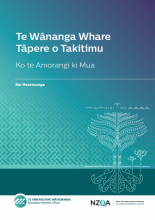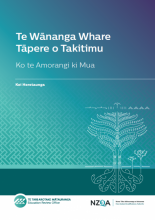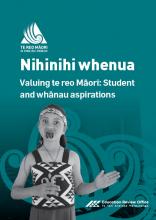- Topics: Children's Villages, Improvement, National Monitoring Study of Student Achievement (NMSSA), Te Pou Mataaho | Evaluation and Research Māori, Te Whāriki
- Published: 10 May 2021
Exploring Collaboration in Action: Kahukura Community of Practice
ERO was approached by principals from Kahukura to document and evaluate their community of practice in Christchurch. This report identifies what is working well for this community of practice, areas where they might consider further enhancements, and lessons and insights into practices which could be shared with others.
- Published: 10 May 2021
Collaboration in Action: Lessons from a Community of Practice
This short report accompanies our report Exploring Collaboration in Action: Kahukura Community of Practice. It looks at the lessons that can be learnt from the Kahukura community of practice, drawing out key lessons on collaboration and providing seven key implications for schools who are interested in collaborating to consider.
- Published: 19 Jan 2021
Te Kahu Whakahaumaru – Ngā mahi a te rangai mātauranga Māori (English)
Te Pou Mataaho, ERO’s evaluation and research group, and Te Uepū ā Motu, ERO’s national evaluation and review team, pursued this evaluation to provide an evidence base about the initial impacts of Covid-19 on Māori-medium education and how the sector responded.
- Published: 19 Jan 2021
Te Kahu Whakahaumaru – Ngā mahi a te rangai mātauranga Māori (Māori)
I whāia tēnei arotake e Te Pou Mataaho, te rōpū arotake, rangahau hoki a Te Tari Arotake Mātauranga me Te Uepū ā-Motu, te rōpū arotake ā-motu a Te Tari Arotake Mātauranga, ki te whakaputa i tētahi kohinga taunakitanga e kitea ai ngā pānga tōmua o te Mate Korona ki te rāngai mātauranga reo Māori, me ngā rautaki i whāia ai e taua rāngai.
- Published: 10 Dec 2020
Te Kahu Whakahaumaru: Māori continue to show resilience across Māori-medium education
In Aotearoa, Māori-medium education experienced significant disruption when the outbreak of Covid-19 forced kura to close their doors, and whānau and kaiako to adjust to home schooling and distance learning. Among the many challenges were access to technology and resources with Māori communities among the most affected.
- Published: 10 Dec 2020
E whakatinana tonu nei te rāngai mātauranga reo Māori i te manawanui
I Aotearoa nei, i tino raru te rāngai mātauranga reo Māori i te horapatanga o te Mate Korona, i kati ai ngā tatau o ngā kura, i mate ai hoki ngā whānau me ngā kaiako ki te tīni i ā rātou mahi ki te whakaako ki te kāinga me te ako tawhiti.
Ko tētahi raru i roto i te huhua, ko te korenga o ngā taputapu matihiko me ngā rauemi, ka mutu ko ngā hapori Māori ērā i rongo i te korekore rawa atu nei.
- Published: 15 Sep 2020
Nihinihi Whenua – Valuing te reo Māori: Student and whānau aspirations
This report provides a snapshot of student and whānau perspectives on the teaching of te reo Māori. It follows the June publication of Te Tāmata Huaroa, which provides a review of the current status of te reo Māori in English medium school settings.
- Published: 18 Jun 2020
Te Tāmata Huaroa: Te Reo Māori in English-medium Schooling
This report gives a snapshot of the current provision of te reo Māori teaching and learning in a representative sample of English-medium primary and secondary schools. The education sector is seen as an important lever in the Government’s Maihi Karauna strategy for language revitalisation.
- Published: 12 Dec 2019
Te Whāriki (2017): Awareness Towards Implementation
ERO’s final report in the Te Whāriki series summarises the findings of previous reports and includes the last two focus areas for the curriculum – how services decide ‘what learning matters here’ and how well they were developing learning-focused partnerships with parents and whānau.
- Published: 27 Jun 2019
Preparedness to implement Te Whāriki (2017)
ERO is undertaking a series of evaluations on the implementation of Te Whāriki: He whāriki mātauranga mō ngā mokopuna o Aotearoa. This report examines how prepared services are to implement Te Whāriki, including their engagement with professional learning and development, and determining 'what matters here' and next steps.
- Published: 15 Nov 2018
Engaging with Te Whāriki (2017)
New Zealand’s early childhood curriculum, Te Whāriki, was updated in April, 2017. Te Whāriki (2017) reflects the changes in theory, practice and early learning contexts that have occurred over the last 20 years. ERO is undertaking a series of evaluations focused on the implementation of Te Whāriki in early learning services from mid-2017 until the end of 2019.
- Published: 12 Jul 2018
Awareness and confidence to work with Te Whāriki (2017)
In this evaluation, ERO wanted to find out how aware and confident leaders and kaiako in early learning services were as they began to work with the updated curriculum, Te Whāriki (2017).
- Published: 14 May 2018
Teaching strategies that work - Reading
The Education Review Office (ERO) has released the latest in its Teaching Strategies that Work series. “Keeping children engaged and achieving in reading” is a description of strategies used by primary schools which have significantly improved their students’ achievement in reading.
- Published: 24 Apr 2018
Evaluation at a glance: A decade of assessment in New Zealand Primary Schools - Practice and trends
High quality assessment and evaluation allows us to focus on student progress and outcomes at classroom, school and system levels. It helps teachers, schools and systems to report on student achievement across points in time, and provide information for parents, trustees and the public about the quality of education.
- Published: 20 Feb 2018
Teaching strategies that work - Mathematics
This Education Review Office (ERO) report is one of a series of reports on teaching strategies that work. It features strategies and approaches that we observed in 40 primary schools selected from across New Zealand. These schools came from a database of 129 schools, all with rolls of 200 or more, in which the proportion of students in the upper primary years (Years 5 to 8) achieving at or above the national standard had increased. In each case achievement levels were also above average for the decile.
- Published: 24 Nov 2017
Teaching approaches and strategies that work
This evaluation looks at teaching approaches and strategies used in schools where there has been a significant increase in the number of students at or above National Standards in the upper primary school years (Years 5 to 8). We wanted to learn more about any short-term interventions or long-term strategies that may have been influential in bringing about these positive achievement trajectories. We have shared and discussed our findings from some of the 40 schools we visited.
- Published: 04 Sep 2017
Leadership for equity and excellence
The senior leadership team are responsible for specific portfolios and work interdependently to realise the shared vision of equity and excellence for all.
- Published: 04 Sep 2017
Leadership
Leadership engages in collaborative consideration of the evidence to inform a considered response to issues identified. Solutions are sought only after a thorough analysis of the problem and consideration of the evidence about what is likely to make the most difference. The implementation of new initiatives is closely evaluated.














